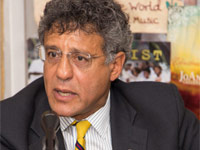
Belize City, Belize; Wednesday, September 5, 2012 – Over 60 high-level delegates from 19 countries spanning the Central American and Caribbean regions concluded a milestone meeting in Belize on Tuesday evening with a comprehensive roadmap for collective action in tackling their biggest obstacles in fisheries and aquaculture.
According to Milton Haughton, CRFM Executive Director, “the long term objective of the of the partnership between the CRFM and OPSESCA is to secure a brighter and more prosperous future for our fishing communities that rely on the marine resources for their livelihoods, and ensuring that the fish stocks are able, through prudent management, to make enhanced contribution to the social and economic development of our countries now and in the future.”
The event was the first joint meeting to bring together as many countries to discuss the plight of their shared marine resources and the uphill battle in fighting illegal, unreported and unregulated (IUU) fishing, which knows no borders. One major outcome of the cross-regional meeting was the signing of the Belize Declaration on Caribbean Regional Fisheries Mechanism (CRFM) and the Central America Fisheries and Aquaculture Organisation (Spanish acronym OSPESCA) Cooperation for Sustainable Development of Fisheries and Aquaculture Resources.
The CRFM and OSPESCA are the regional agents for the harmonisation of fisheries management and development efforts across 24 states.
“We are delighted to partnership in ensuring that countries around the Caribbean and indeed the Central and South American region have seen the wisdom of getting together and pooling resources in order to protect what we consider to be a very important part of our countries’ very existence,” said V. Alfred Gray, chair of the CRFM’s Ministerial Council, and Minister of Agriculture, Marine Resources and Local Government of the Bahamas.
Gray expressed optimism that “bigger and better things” would come out of the Belize meeting: “So out of this conference,” he said. “I am hoping that each of us as countries, each of us as individuals, will be ready to take on the challenges which we face collectively in protecting that which we believe is so important for fisher folk and indeed our countries’ revenue resources.”
“One of the difficult issues we will be considering during this meeting is the issue of IUU fishing, as we have already heard,” said CRFM Executive Director Milton Haughton.
He explained that IUU fishing, which he described as “a serious global problem,” is fishing carried out in contravention of the rules for fisheries management, misreporting catches or not reporting at all, and the use of illegal fishing rear and illegal fishing techniques.
“Recent reports put the global value of catches taken by IUU fishing as high as 9 billion dollars per year. IUU fishing does not respect national boundaries. It puts unsustainable pressure on fish stocks and marine habitats and distorts markets. It imposes significant economic costs on countries such as ours with limited capacity and it also corrupts and undermines governance structures,” said Haughton. “We must therefore redouble our efforts to eradicate the scourge of IUU fishing from our region.”
Haughton also spoke of the need to harmonise coordinated approaches for the conservation, management and sustainable use of trans-boundary fish stocks; namely tunas, lobster, conch.
Belize, the only country which belongs to both regions, is an important player in the process. Lisel Alamlla, Belize Minister of Forestry, Fisheries and Sustainable Development, said: “We are interested in collaborating with all the countries to ensure the best use and best management of our fisheries resources.”
Helping the diverse nations spanning Central America and the Caribbean to succeed at this task despite their differences is the job Belize is best suited for: “We can advance and support building trust between the regions, and I think that is the opportunity that Belize has and the responsibility that it has, really,” Alamilla added.
Danilo Rosales Pichardo, pro-tem chair of OSPESCA and Vice President of the Nicaraguan Institute of Fisheries, said he is happy that Belize has brought together both sub-regions to address the challenges that they collectively face, and they will address them, he said, “poco a poco” or “bit by bit.”
The CRFM-OSPESCA collaborative work, said Rosales Pichardo, will be addressed via a phased approach, and the action plan coming out of this meeting will guide the way forward.
“It is said that the journey of a thousand miles begins with the first step,” Alamilla asserted. “In my opinion, I believe that what we have accomplished thus far, and what we are expected to accomplish in terms of the Belize declaration and the accompanying action plan and an MOU [Memorandum of Understanding] to formalise the process can best be characterised as a great leap forward for the sustainable development of our people and the fishery resources of [the] CARICOM sub-region as well as [the] SICA sub-region.”
The 18 countries which signed the Belize declaration are: Anguilla, The Bahamas, Barbados, Belize, Costa Rica, Grenada, Guatemala, Guyana, Honduras, Jamaica, Montserrat, Nicaragua, Panama, St. Kitts & Nevis, St. Lucia, St. Vincent & the Grenadines, Trinidad & Tobago, and Turks & Caicos.
Antigua & Barbuda, Dominica, the Dominican Republic, El Salvador, Haiti and Suriname were not represented by their ministers at the meeting and did not sign the declaration.
International partners from ACP Fish II, The Caribbean Large Marine Ecosystem Project, the SICA (Central American Integration and CARICOM (Caribbean Community) Secretariats, as well as visitors from the FAO in Rome were among the observers. Belize fishermen’s cooperative reps also attended the event.
The signed Belize Declaration (1.3MB PDF)
By Caribbean Regional Fisheries Mechanism Secretariat



